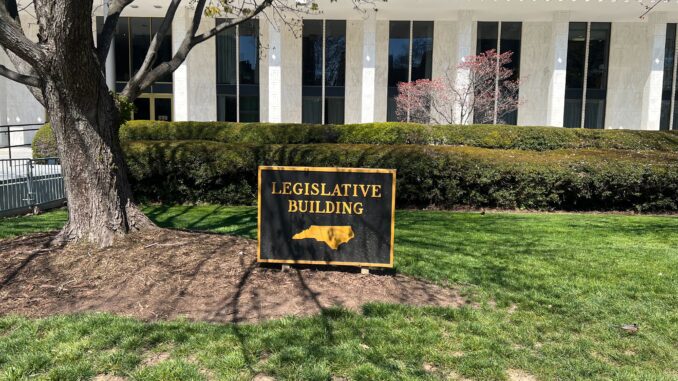
RALEIGH — At a joint press conference on May 2, Senate Leader Phil Berger (R-Eden) and House Speaker Tim Moore (R-Kings Mountain), the lawmakers announced that a consensus on abortion limits had been reached between the majority caucuses in both chambers.
General Assembly leaders said the legislation limiting abortion in the state to 12 weeks will be part of a conference report for Senate Bill 20, the “Care for Women, Children, and Families Act.”
Senate Bill 20’s original title was “Safe Surrender Infants” and the revised bill will include elements of Senate Bill 20’s original language.
Changes to North Carolina’s abortion laws under the bill would include limits on elective abortions in the second and third trimesters, including an exception for rape and incest through 20 weeks, and establishes an exception for fetal life-limiting anomalies through 24 weeks.
If the bill becomes law, failure to comply by physicians could result in being reported to the medical board and a $5,000 fine.
“It’s been an arduous process but as you’ll see the bill that has been developed is a common-sense reasonable approach to restricting second and third-trimester abortions and addressing maternal and infant care,” Berger said.
“You know, after the reversal of Roe, determining abortion restrictions was left to the states – as it frankly always should have been,” said Moore. “We do not take this responsibility lightly, that for the first time in 50 years, the North Carolina General Assembly is having to address this most difficult and controversial issue at times.
“I’m very proud of the way that we have done this in a very holistic way,” Moore said. “We have dealt with not only the issue of abortion, but also health care when it comes to mothers, health care of children, and really trying to provide a comprehensive approach in a way that is compassionate.”
Abortion through 20 weeks of pregnancy is the current legal limit in North Carolina, with certain medical exceptions such as saving the life of the mother or cases of rape or incest.
North Carolina also has an informed consent statute that includes a 72-hour waiting period before having an abortion after a woman first meets with a doctor or facility that provides abortions. Under the statute, women must be informed of the risks of the procedure, the gestational age of the baby at the time the abortion is performed, and the woman is given the opportunity to have a “real-time view of the unborn child and heart tone monitoring.”
A recent poll by Carolina Partnership for Reform showed 56% of voters, including 51% of Unaffiliated voters and 42% of Democrats, support a 12-week limit on abortion with the same exceptions as the current law.
Berger and Moore were joined by Rep. Sarah Stevens (R-Surry), Sen. Amy Galey (R-Alamance), Sen. Lisa Barnes (R-Nash). and Sen. Joyce Krawiec (R-Forsyth). Each of the three women took turns discussing some of the other elements of the bill.
“We have the opportunity to save many lives,” Krawiec said. “We have the opportunity to provide women and families options that they haven’t had before. We have the opportunity to show them that children are not burdens, that they are the greatest joy of your life and we have the opportunity to modernize our pro-life laws.”
“The unborn have a fundamental right to be born,” Stevens said during the press conference.
Stevens also said a number of pro-woman and pro-family spending was in the bill such as $3.5 million dollars for contraception, $2.8 million for reducing maternal morbidity, and adoption tax credits.
Other provisions include:
- $75 million to expand access to child care
- Over $16 million (including federal matching funds) to reduce infant and maternal mortality
- $20 million to pay for maternity and paternity leave for teachers and state employees
- Nearly $59 million (not including federal matching funds) for foster care, kinship care, and children’s homes
- $7 million to increase access to long-lasting, reversible birth control for underserved, uninsured, or medically indigent patients
- $3 million to help mothers and fathers complete community college
The bill is the result of multiple weeks of negotiations in bipartisan working groups. Lawmakers said the House had 20 to 30 people in working groups at the start but they got smaller as a decision was neared.
When asked if Democrats were involved, Krawiec said they reached out and did not have anyone join.
The bill will also include provisions to protect babies who are born alive as a result of a failed abortion, prohibitions on abortions for eugenics reasons, increased funding through Medicaid for pregnancy care, and funding for crisis pregnancy centers.
Criminal provisions of the bill include making it a Class D felony and a $250,000 fine for any physician failing to care for babies born alive following a botched procedure and any person or organization caught mailing, supplying, or providing abortion-inducing drugs to a woman is subject to a $5,000 fine per violation.
Additionally, there will be a $5,000 fine per violation for illegally advertising abortion-inducing drugs to women, an assault on pregnant women will have penalties increased, and the 10-year GPS monitoring for certain repeat and violent sexual offenders will be bumped up to lifetime monitoring.
Lawmakers are fast-tracking the bill, with a floor vote expected by Thursday; just ahead of the crossover deadline of May 4.
Gov. Roy Cooper has stated he would veto any bill containing new abortion limits and tweeted his opposition to the bill just as the press conference was ending.
“This proposal erodes even further the freedom of women and their doctors to make deeply personal health care decisions,” Cooper tweeted. “I along with most North Carolinians are alarmed by the overreach of Republican politicians into people’s personal lives and I strongly oppose it. – RC.”
The governor also made his position clear following the release of the U.S. Supreme Court decision in Dobbs v. Jackson, which overturned Roe v. Wade and returned abortion decisions to the states and again when the U.S. Supreme Court finally rendered its decision in the Dobbs case.
“For 50 years women have relied on their constitutional right to make their own medical decisions, but today that right has been tragically ripped away,” tweeted Cooper. “That means it’s up to the states to determine whether women get reproductive healthcare, and in North Carolina they still can. I will continue to trust women to make their own medical decisions as we fight to keep politicians out of the doctor’s exam room.”
A veto override could likely be successful as both chambers now hold a super-majority. The House’s newest Republican, Rep. Tricia Cotham of Mecklenburg County, would hold the key vote for a successful override in that chamber.
Pro-abortion groups like Planned Parenthood will likely sue. Additionally, Attorney General Josh Stein’s remarks following the Dobbs decision signal that he is unlikely to defend the state if a legal challenge is filed.
“I have a message for the women of North Carolina: you still have a legal right to an abortion in our state. North Carolina state law protects women’s reproductive freedoms, even after the Supreme Court today stripped women of their right to an abortion under the Constitution by overturning Roe v. Wade,” Stein said in a press release following the Dobbs decision. “If we want to keep our freedoms under state law, then we have to elect state officials who commit to protecting them.”
Stein announced his bid to replace Cooper as governor earlier this year.
“North Carolinians have the right to make their own health care decisions without politicians like Phil Berger, Mark Robinson, and Tim Moore getting in the way,” said North Carolina Democratic Party Chair Anderson Clayton said in a statement. “One year after the nation learned of the unprecedented overturning of Roe v. Wade, North Carolina Republicans are continuing their relentless war on our freedoms by rushing through an extreme abortion ban that is out of step with our North Carolina values.”
This is a developing story and may be updated.




